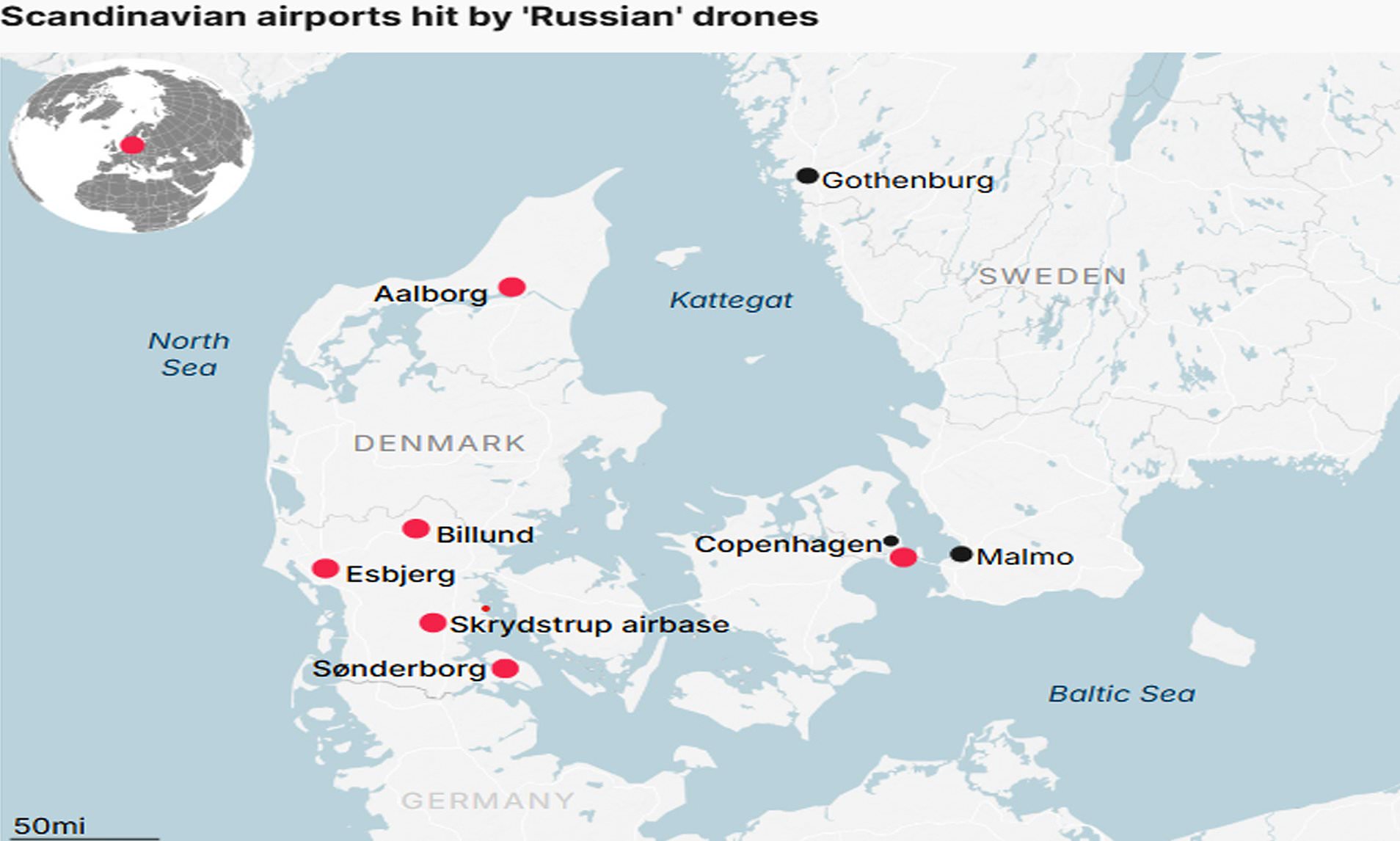
Drone Sightings Surge in Denmark Amidst Heightened Security Concerns
Denmark is on high alert following a series of drone incidents that have disrupted airport operations and sparked widespread public concern. In the past 24 hours, Danish citizens have reported over 500 potential drone sightings, adding to the anxiety fueled by recent aerial disruptions. These incidents have occurred against a backdrop of heightened tensions in Europe, with some officials linking the activity to Russia.
The initial disruptions occurred earlier in the week, leading to temporary closures of two Danish airports. Authorities have described these events as a coordinated operation and a potential "hybrid attack." Prior to this, Copenhagen airport experienced drone-related disruptions that impacted approximately 100 flights and left an estimated 20,000 passengers stranded.
As investigations continue to determine the responsible parties behind these incidents, the Danish public remains vigilant, scanning the skies for any further signs of unwanted aerial activity. Police are currently verifying the reported sightings and have urged the public to continue reporting any suspicious activity with detailed descriptions.
Europe Considers a Unified "Drone Wall" in Response
The recent drone incursions have prompted European ministers to consider a comprehensive, continent-wide strategy to counter aerial threats. The proposal involves the creation of a "drone wall," intended to protect against potential incursions. This initiative comes as concerns grow about the vulnerability of European airspace amidst escalating tensions between Russia and NATO.
Denmark, Finland, Poland, and the Baltic states are expected to join Ukraine in a summit to develop plans for this unified defense system. European Commission President Ursula von der Leyen has emphasized the importance of such a system as "the bedrock of credible defence."
The European Commission has suggested that the proposed €150 billion Security Action for Europe loans scheme could potentially cover the cost of the "drone wall." The meeting of ministers in Brussels is expected to focus on establishing joint systems for the detection and neutralization of drones that pose a threat to both civilian and military infrastructure.
Danish Response and Ongoing Investigations
Danish Defence Minister Troels Lund Poulsen has confirmed that Denmark has been specifically targeted, with multiple airports experiencing drone-related disruptions on the same night. Aalborg Airport, which handles both commercial and military flights, was forced to close for three hours, while Billund Airport, Denmark's second-largest, was shut down for an hour. Drone sightings were also reported near Esbjerg and Sonderborg airports, as well as Skrydstrup Airbase, home to Denmark's F-16 and F-35 fighter jets, and over a military facility in Holstebro.
Poulsen described the incidents as a "systematic operation in so many locations at virtually the same time," indicating the involvement of a "professional actor." He characterized the situation as a "hybrid attack using different types of drones" and emphasized the need to stay ahead in the evolving technological landscape.
Danish Prime Minister Mette Frederiksen has discussed the situation with NATO Secretary General Mark Rutte. Rutte affirmed that "NATO allies and Denmark are working together on how we can ensure the safety and security of our critical infrastructure."
Officials acknowledge the difficulty in detecting drones, particularly those utilizing advanced technology. The challenges involve both identifying the drones and determining the appropriate response measures. Police in Denmark are investigating the possibility that some of the drones were launched from ships off the coast, noting the presence of two Russian vessels in the area at the time of the incidents.
Russia's Response and Escalating Tensions
The Russian embassy in Copenhagen has dismissed any suggestions of involvement as "absurd" and described the incidents as a "staged provocation" intended to escalate tensions.
Justice Minister Peter Hummelgaard has warned that "the threat from hybrid attacks is here to stay" and described the recent events as "deeply worrying incidents across Europe." He stated that new laws would grant infrastructure owners the authority to neutralize drones themselves.
Meanwhile, Russian Ambassador to France, Alexey Meshkov, warned that shooting down Russian planes "would be war," further escalating tensions. Russian Foreign Minister Sergei Lavrov accused NATO of waging a "real war" against Russia and claimed the organization was directly involved in the conflict with Ukraine.
Poland's Stance and Broader European Concerns
Polish Prime Minister Donald Tusk has cautioned that "the situation brings us the closest we have been to open conflict since World War Two" and confirmed that Poland will take action if its airspace is violated. "We will take the decision to shoot down flying objects when they violate our territory and fly over Poland - there is absolutely no discussion about that," he stated.
Earlier this month, Poland shot down three Russian drones that crossed into NATO territory, marking the first instance of such action since the full-scale invasion of Ukraine began in 2022. Tusk emphasized Poland's commitment to caution in ambiguous situations, highlighting the need for careful consideration before taking actions that could trigger a more acute phase of conflict.
Across Europe, officials believe that the Kremlin is deliberately orchestrating incidents that stop short of outright attacks but nonetheless require a NATO response.
Estonia reported three Russian fighter jets entering its skies, while Romania reported a drone strike on one of its border areas. These events are viewed by European officials as deliberate provocations aimed at unsettling NATO.
The UK has also taken action, with the Royal Navy deploying HMS Iron Duke and a Wildcat helicopter to monitor the movements of a Russian frigate and cargo ship through the English Channel. Defence Minister Luke Pollard emphasized the Royal Navy's commitment to protecting UK waters and undersea cables, as well as deterring Russian aggression alongside NATO allies.


No comments:
Post a Comment